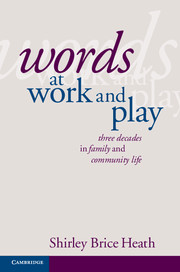Book contents
- Frontmatter
- Contents
- Maps, family trees, figures, and tables
- Acknowledgments
- Note on transcriptions
- Epigraph
- Prologue
- 1 On being long in company
- 2 A boy finds his mama(s)
- 3 The closeness of strangers
- 4 Embracing talk
- 5 Lines of vision
- 6 The hand of play
- 7 Ways with time and words
- 8 Shaping the mainstream
- Epilogue
- Appendix A Ethnography as biography and autobiography
- Appendix B On methods of social history and ethnography
- Notes to text
- References
- Index
3 - The closeness of strangers
Published online by Cambridge University Press: 05 August 2012
- Frontmatter
- Contents
- Maps, family trees, figures, and tables
- Acknowledgments
- Note on transcriptions
- Epigraph
- Prologue
- 1 On being long in company
- 2 A boy finds his mama(s)
- 3 The closeness of strangers
- 4 Embracing talk
- 5 Lines of vision
- 6 The hand of play
- 7 Ways with time and words
- 8 Shaping the mainstream
- Epilogue
- Appendix A Ethnography as biography and autobiography
- Appendix B On methods of social history and ethnography
- Notes to text
- References
- Index
Summary
Martin Brown grew up in Roadville, barely three miles away from Trackton. Born in 1970, four years after Zinnia Mae, Martin was the son of textile mill workers Peggy and Lee Brown. During early childhood Martin and his brother, Danny, two years younger, stayed with their mother at home during the day, and their father at night. He worked the day shift at the mill, she took the second shift. Peggy’s sister and her husband lived just down the street. Children played in one another’s yards and were quick to collect at the back steps of any kitchen from which the smell of fresh-baked cookies came. Teens took over carports and driveways to work on one another’s bicycle, motor scooter, or the family power lawnmower.
Church events took up several chunks of family time each week, and by the time they were six, Roadville’s children took pride in the number of Bible verses they knew and the books of the Bible they could name. Reading in preparation for Sunday School or Bible Study activities and the writing of recipes, thank-you notes, or grocery lists took place while family members sat around the kitchen table. When children did their homework, they sat at the table, working while an adult prepared meals or cleaned the kitchen. Before children started school, either mom or dad obeyed children’s demands for a bedtime story, usually drawn from books given out in Sunday School or bought from stands near the checkout counter in grocery stores. Every Sunday for dinner, family and friends gathered, adults at the dining-room table, children at the kitchen table with the eldest child in charge of the younger ones. The eldest male offered the prayer of thanks, including blessings of the week and special needs of loved ones who were sick or facing unusual hardships. At the adult table, gossip, family news, information about changes at the mill, and incidents from recent fishing trips circulated. The children’s table went unnoticed by adults, unless the laughter and noise got “out of control.” A word of warning issued by a male voice from the dining room was followed by muffled giggles. Once the children cleaned their plates and put their dishes in the sink, they escaped outside to play or to resume a softball game.
- Type
- Chapter
- Information
- Words at Work and PlayThree Decades in Family and Community Life, pp. 41 - 66Publisher: Cambridge University PressPrint publication year: 2012



